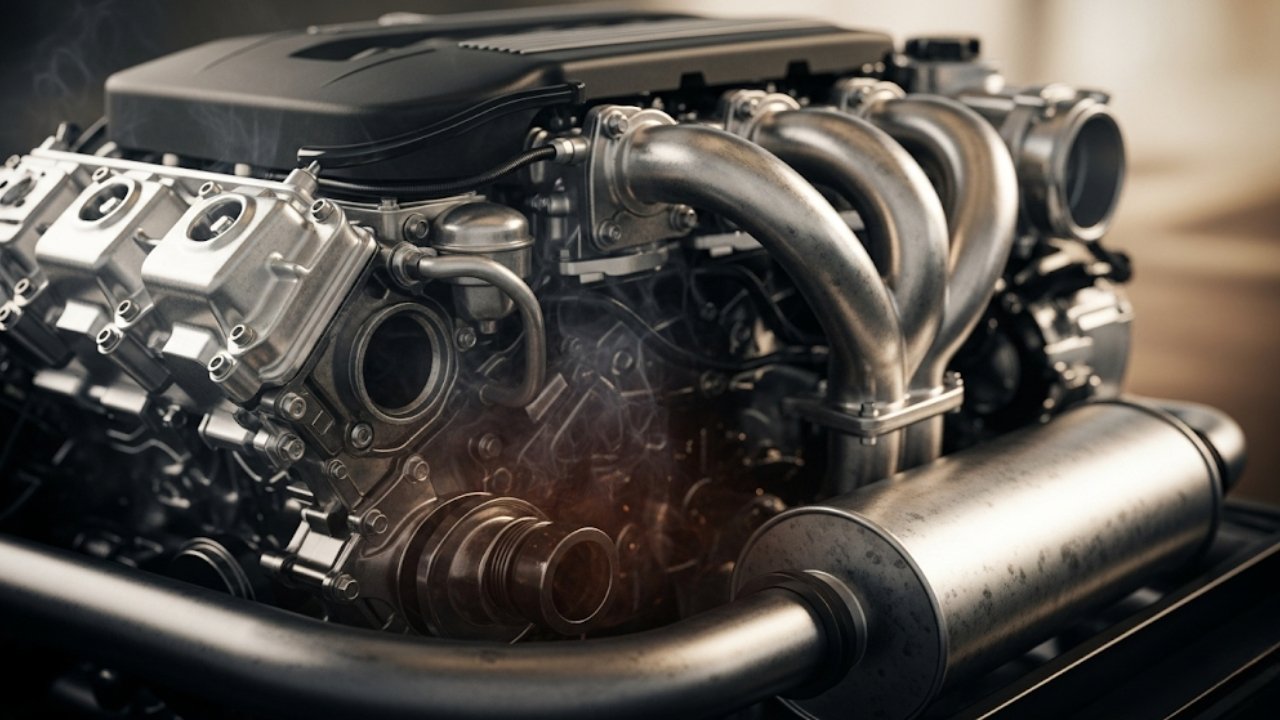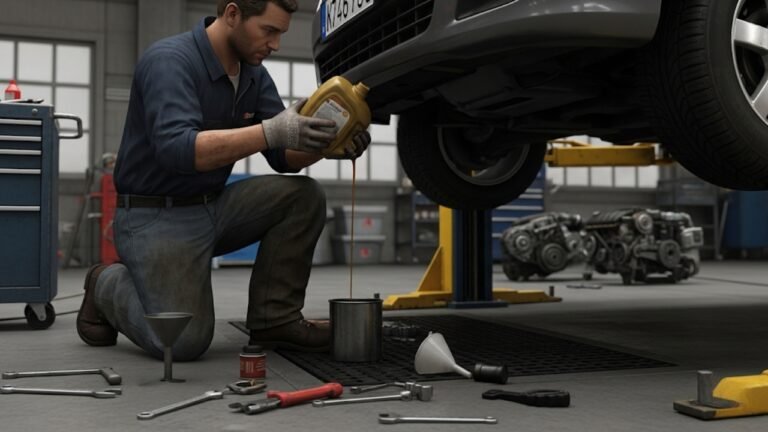Why Do I Smell Oil Burning in My Car?

Hey, friend — have you ever been driving on a lazy Sunday, windows down, music rolling, and then it hits you: a sharp, oil burning smell that almost knocks you out? I’ve been there, and trust me, that sinking feeling in your gut is real. When you smell oil burning in car, it can feel like your ride is crying for help. But don’t panic yet. Let’s break down why your car might smell like a smoky oil pan and what you can do before things get worse.
In this story-driven guide, I’ll share what I’ve learned from countless chats with mechanics, sweaty afternoons under the hood, and a few not-so-fun roadside breakdowns. You’ll get honest advice, a sprinkle of relatable tales, and clear steps to follow.
That Sharp Smell: What’s Really Going On?

Sometimes it’s a tiny leak, like a pinhole in a gasket. Other times, it’s a huge mess under your valve cover. It could also be as simple as oil spilled during an oil change. The hot engine cooks it, and you catch that gross burnt smell.
Key reasons your car might smell oil burning:
Oil leaking onto the exhaust manifold
Bad valve cover gasket
Worn piston rings
Old, cracked seals
Spilled oil that was never cleaned
Quick warning signs to look for along with the smell:
Blue or gray smoke from the exhaust
Low oil level
Dashboard oil light on
Small oil puddles under your car
If any of these match up, it’s time to roll up your sleeves or call your trusted mechanic.
My First Burnt Oil Smell: A Short Story
I remember the first time I noticed the smell oil burning in car. It was on the way to visit my grandma, about two hours from home. I was halfway there, jamming to some 90s hits, when I smelled something bitter. I thought maybe I’d run over roadkill (gross, I know) but soon realized it was coming from under the hood.
I pulled over, popped the hood, and there it was — oil dripping onto my sizzling exhaust. The panic was real. I called my buddy, a shade-tree mechanic, who walked me through checking the oil level and told me to look for leaks around the valve cover. That night, I learned the hard way about valve cover gaskets, but hey — it saved my engine.
Sometimes these moments turn into stories you’ll laugh about later. But you definitely don’t want to ignore the burning oil smell for too long.
What Parts Might Be Failing? Let’s Dig Deeper
If you smell oil burning in car, your gut may scream “leak,” and it’s usually right. Here’s a deeper dive into what might be going wrong under your hood:
| Possible Cause | What It Means | Fix Needed |
|---|---|---|
| Valve Cover Gasket Leak | Oil seeps onto engine or exhaust | Replace the gasket |
| PCV Valve Failure | Pressure forces oil into hot parts | Replace PCV valve |
| Oil Pan Gasket Leak | Oil drips on the bottom, hits hot surfaces | Replace oil pan gasket |
| Worn Piston Rings | Oil burns in the cylinders, causes blue smoke | Engine rebuild (more expensive) |
| Crankshaft Seal Leak | Oil near timing belt or pulley area | Replace crankshaft seal |
| Spilled Oil After Oil Change | Residue burns off after contact with the block | Clean the spilled oil thoroughly |
Seeing it in a table makes it easier to process. Oil leaks might sound scary, but often they’re not a death sentence for your car — if you catch them early.
The Risks: Why Ignoring It Can Cost You
You might think, “Oh, it’s just a bit of a smell,” but trust me, that smell is a red flag. If you ignore a car burning oil smell, you’re playing with fire — literally.
Oil leaks that hit a hot exhaust can catch fire. Even if they don’t, you’re losing precious oil your engine needs. Running low on oil will grind your engine parts down, leading to a seized motor. That’s a wallet-crusher no one wants.
Besides, your passengers will probably complain about the eye-burning smoke and funky smell in the cabin. That’s no way to impress a date, right?
Why you shouldn’t ignore it:
Risk of engine fire
Engine damage from low oil
Harmful smoke inside the car
Long-term, costly repairs
I know money is tight these days. Fixing a $100 gasket leak beats a $4,000 engine rebuild every time.
How to Check for the Burning Oil Smell at Home
Look, you don’t have to be a pro to sniff out a problem (pun intended). Here’s a simple routine I use that might help you:
Park the car on a clean driveway
Check under the car for fresh oil spots
Pop the hood and look for wet, shiny spots
Smell around the engine while it’s warm (be careful!)
Check oil levels on the dipstick
If you see or smell fresh oil around the valve cover, oil pan, or the exhaust manifold, chances are you’ve found your suspect.
Here’s a quick metaphor: think of your engine like a kitchen. If oil is splattering onto a hot frying pan, you’ll smell it — and that’s exactly what’s happening under the hood.
How Mechanics Diagnose That Burning Oil Smell
When you take it to a shop, a mechanic will usually follow a pattern:
Visual inspection
Dye testing with UV light
Pressure testing
Checking compression for piston rings
They might clean the engine and have you drive for a day or two, then look again to see where fresh oil comes from. That’s how they catch sneaky leaks.
I used to think mechanics had a “magic nose,” but it’s really just a step-by-step process. If you’re curious, hang around and ask questions. Most techs love to explain.
What It Might Cost to Fix That Burning Oil Smell
Money talk — let’s get real. Fixing the smell oil burning in car problem can cost anywhere from $50 for a valve cover gasket to thousands if your piston rings are toast.
Here’s a rough cost breakdown:
Valve cover gasket: $100–$300
PCV valve: $50–$150
Oil pan gasket: $200–$500
Piston rings: $1,500–$4,000 (big job)
I know those numbers can sting. But remember, oil leaks usually get worse, not better. Small leaks are cheaper to fix than huge repairs down the line.
Signs the Burning Oil Smell Means Big Trouble
Okay, friend, let’s get real for a sec. Sometimes, the burning oil smell is a preview of bigger headaches:
Constant blue exhaust smoke
Severe loss of oil (needing to top up weekly)
Rough engine idle
Knocking or tapping noises
Those signs scream “get to a mechanic now.” You could have bad piston rings, a blown head gasket, or other serious internal engine damage.
If you’re ever in doubt, it’s cheaper to pay a mechanic to look than to risk a blown motor.
How to Prevent Burning Oil Smells Before They Happen
If you want to avoid the panic of smelling oil burning while you’re driving, there are a few habits that can save you from trouble. Think of these as little bits of car-care wisdom that act like wearing a raincoat before the storm hits.
First, check your oil level every couple of weeks. I know, it sounds old-school, but it takes two minutes and can catch problems early. Also, keep an eye under your car after you park — any new oil spots on the driveway can give you a heads-up before a full-blown leak shows up.
Another helpful habit is to look for routine inspections with every oil change. A mechanic can spot a leaking gasket before it fails. Sometimes they see things you’d never notice — like a hairline crack on a seal or a slightly loose bolt.
Finally, don’t ignore smells. I know life is busy. You’ve got bills, kids, a job, maybe even a side hustle. But your car’s oil leak will only get worse if ignored. If you smell oil burning in car, act on it quickly to protect your wallet and your ride.
Cultural Moment: Cars and Pride
Growing up, my uncle always said, “A clean car means a clear mind.” For him, taking care of his old sedan was a point of pride. He taught me that watching for oil leaks and weird smells wasn’t just about avoiding repairs. It was about respecting your car, the same way you respect your home.
In many cultures, a car is more than wheels — it’s freedom, status, even part of your identity. That’s why when something like the burning oil smell happens, it can feel personal, almost like your trusted companion is sick.
I get it. That’s why I’m writing this like a friend: because I know you want your car to be healthy and to keep you safe.
How the Weather Can Affect Oil Burning Smells
Here’s a little-known tip — weather can make a difference. If you live somewhere hot and humid, a small leak will burn off faster, giving you a stronger burning oil smell sooner.
In cold places, you might not notice the smell right away because the oil takes longer to hit high temps. That’s why some people only notice it after a highway drive, not during short city hops.
Also, weather changes can make gaskets shrink or swell. When it’s freezing out, seals can harden and crack, causing new leaks that weren’t there before. So if you notice a new car burning oil smell during a cold snap, you aren’t imagining things.
Emotional Impact of a Burning Oil Smell
Let’s be real — catching a smell oil burning in car is more than mechanical. It messes with your mind. You might feel anxious, worried, or even embarrassed if a friend hops in and crinkles their nose.
I remember picking up my date once, and the car reeked of burnt oil. She tried to be nice but ended up riding with the window down. Ouch. After that, I vowed never to ignore any engine smell again.
Your car should feel like a second home, not a burned-down kitchen. If you sense that harsh, chemical, oily scent, your emotions are valid. Take action sooner rather than later.
What Happens If You Keep Driving?
I get it — you’re busy, and mechanics can be expensive. But if you keep driving with that burning oil smell, you’re rolling the dice.
Here’s what might happen if you ignore it:
Oil level drops, starving the engine of lubrication
Engine parts grind and wear out
Oil catches fire on a hot exhaust
Whole engine seizes and stops working
The engine is the heart of your car. Oil is its blood. Losing that blood is deadly. Treat your engine like you’d treat your own health.
Is the Burning Oil Smell Ever “Normal”?
You might wonder if any oil smell is normal. The honest answer? Only briefly. For example, if you change your oil and accidentally spill a bit on the block, you’ll smell burning oil for a few drives until it evaporates. That’s fine — as long as it goes away soon.
But if the smell oil burning in car sticks around for days or even weeks, you’ve got a leak. There’s no such thing as “normal” burning oil over the long term.
The Future of Cars and Oil Leaks
If you’re wondering about the future, here’s something hopeful. Many modern engines now use improved gaskets and tighter tolerances, reducing leaks. Some hybrids and EVs don’t even burn engine oil at all, so those nasty smells could become a thing of the past.
Still, until every car is electric, we’ll keep battling oil leaks. That’s why it pays to know how to spot a burning oil smell early.
FAQs: Your Burning Oil Questions Answered
Q1. Is it safe to drive if I smell oil burning in my car?
Honestly, no. It might seem safe for short trips, but you risk a fire or engine damage.
Q2. Why do I only smell oil burning when the engine is hot?
Because the oil hits hot parts like the exhaust manifold, and only then does it burn and smell.
Q3. Can spilled oil after an oil change cause this smell?
Yes! If they spilled oil on the engine, it will burn off and smell until cleaned.
Q4. Does the color of smoke matter?
Yes. Blue smoke usually means oil burning in the combustion chamber.
Q5. Can I fix a burning oil smell myself?
If it’s just a leaky valve cover or spilled oil, you can. Anything deeper, see a mechanic.
Q6. Why does my car burn more oil in summer?
Heat makes seals expand and oil thinner, so leaks happen faster.
Q7. Should I worry if I see blue smoke but no smell?
Yes, blue smoke is a sign oil is burning inside your engine, even if you don’t smell it.
Q8. Can using cheap oil cause burning smells?
It can. Cheap oils might break down faster and leak past old seals.
Final Thoughts: Your Car, Your Story
Friend, I know this topic feels intimidating. But your car is part of your story — your road trips, your errands, your dreams. When something feels off, like that smell oil burning in car, trust your senses.
Fixing an oil leak might seem small, but it means you respect your ride and protect yourself from scary, costly damage later.
I’ve had these problems, too, and I can tell you from my heart: you’ll feel a lot safer and more confident once you track down that smell and fix it.
Stay safe out there, and keep rolling with confidence.






